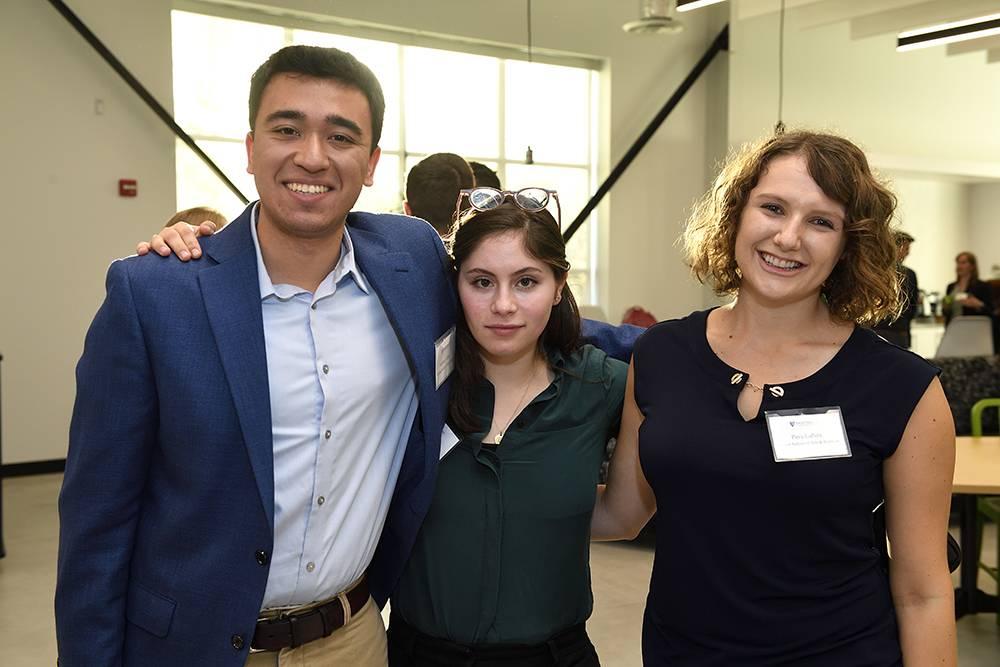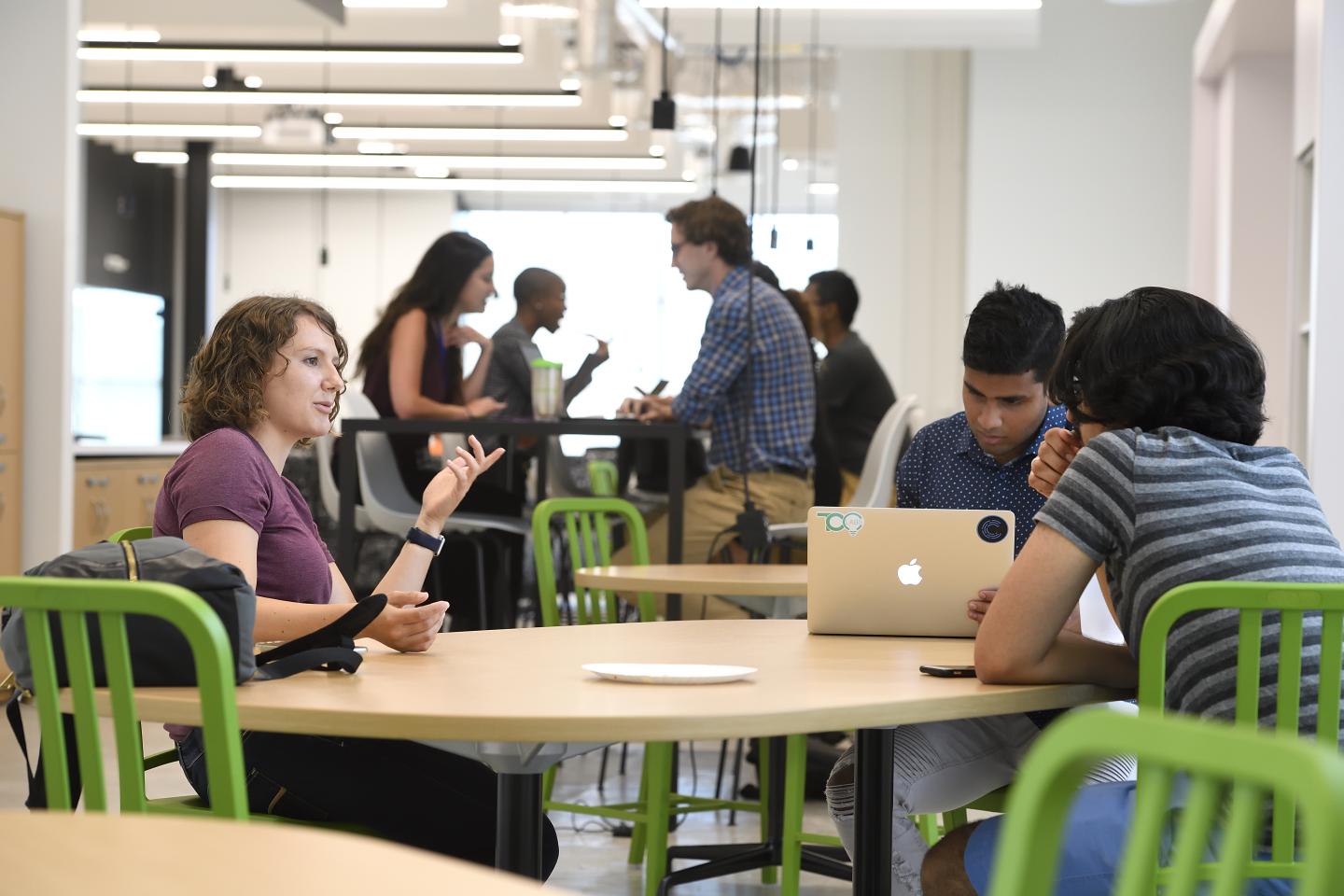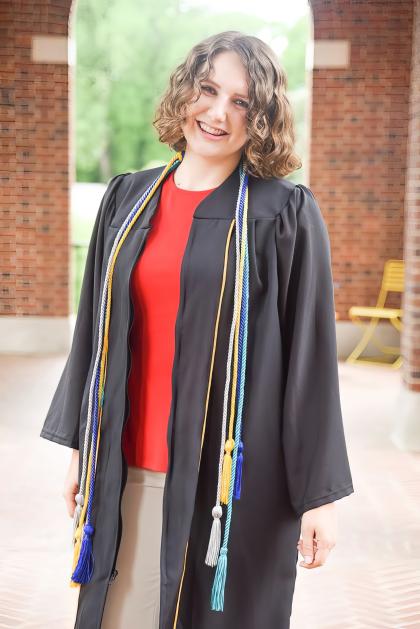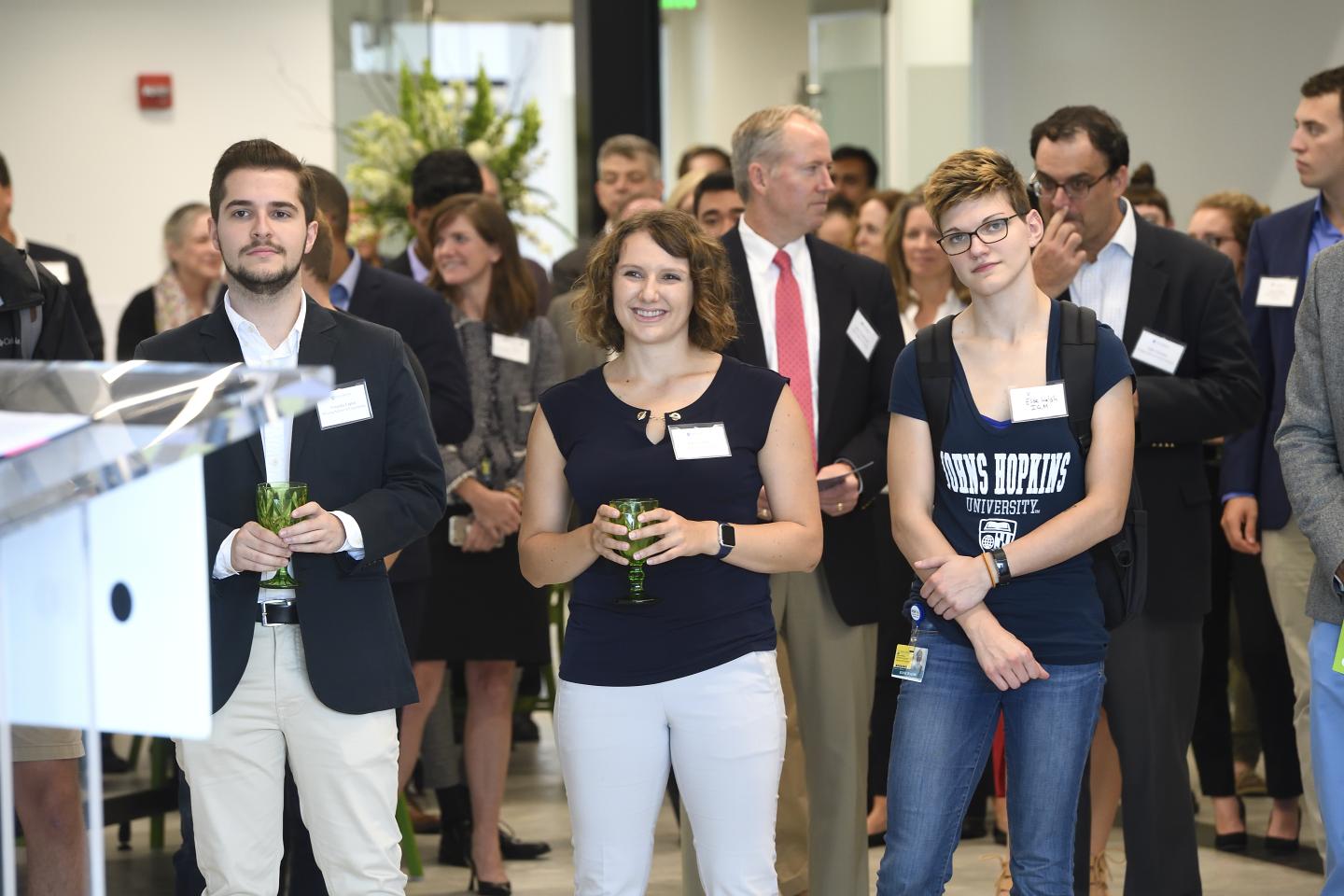
The following was originally published by the Hub.
Johns Hopkins University’s student entrepreneurship and innovation hub, FastForward U, will be renamed for alum and EcoMap Technologies co-founder Pava Marie LaPere in a ceremony on Saturday, April 6.
LaPere, A&S ’19, was a tireless and vocal advocate for local and undergraduate entrepreneurship and a strong supporter of FastForward U, describing the space’s creation as “one of the highlights of my time at JHU.” Going forward, it will be called the Pava Center in honor of LaPere, who died in September 2023.
“Pava was vital to the new wave of entrepreneurship from our students across our campuses,” said Josh Ambrose, director of student ventures at FastForward U. “Her fingerprints are across all the many things we do.”
After graduating high school in Tucson, Arizona, LaPere moved to Baltimore to attend Johns Hopkins University. Though she originally applied with the intention of becoming a doctor, she soon realized that her passions lay elsewhere.
“If you really wanted to see what made change in the world, what really got something moving in a certain direction, you had to follow the money,” LaPere said in a 2019 talk at TEDx Johns Hopkins University. “So I decided that if I wanted to make change on a larger scale, I should go into business.”
But pursuing that dream was easier said than done, especially at a university with no undergraduate business degree. When LaPere first arrived on the Homewood campus in 2015, the institution’s support for undergraduate entrepreneurs was limited. FastForward U didn’t exist yet. There were no makerspaces or student startup incubators. And although there were business opportunities through Johns Hopkins Technology Ventures (JHTV), that initiative was initially built to support professional researchers. At the time, it did not offer customized support for undergraduates or those working on business ideas outside a university lab.
LaPere wasn’t the only student to spot this problem. Her classmate Anthony Garay, Engr ’19, was in the process of starting a student group to support young entrepreneurs on campus when he invited LaPere and another classmate, Brooke Stephanian, Engr ’19, to join the fledgling club as bloggers.
“Then the first meeting came and [Pava] basically started running the meeting,” Garay said. “I was like, ‘Oh, she’s not gonna be a blogger.'”

Anthony Garay, Brooke Stephanian, and Pava LaPere at the grand opening of FastForward U’s Homewood hub. IMAGE CREDIT: WILL KIRK / JOHNS HOPKINS UNIVERSITY
The result was TCO Labs. Short for “The Crazy Ones,” TCO Labs was a student-run nonprofit that worked to create a stronger entrepreneurial ecosystem for students at JHU. LaPere, Garay, and Stephanian all ran the group as co-founders, creating incubator programs, matching students with internships, and hosting networking events. Like any good entrepreneurs, the trio had noticed a problem and built a solution.
As president and co-founder of TCO Labs, LaPere believed strongly in giving undergraduate entrepreneurs the chance to experiment. In her eyes, teaching students the fundamentals of building and launching a business was more important than the financial success of any single idea. TCO Labs, she hoped, would give students the chance to not only succeed, but to fail safely. Then they could use that experience to try again.
“Why do we insist that medical students cut into hundreds of cadavers before ever stepping foot near a patient? Because we want to make sure they know what they are doing when the stakes are real,” LaPere wrote in 2018. “The purpose of supporting undergraduate entrepreneurship is not to produce ventures, it is to produce entrepreneurs.”
To do this, TCO Labs created the Hatchery. As the incubator/accelerator portion of the nonprofit, the Hatchery invited students to pitch their startup ideas. If the students seemed passionate and the idea seemed solid, then TCO Labs would take the nascent startup under its wing, providing the founders with mentorship and resources.
LaPere, with her trademark enthusiasm, wrote all of the Hatchery’s programming. While doing so, she realized just how many brilliant people were missing the tools and information they needed to become entrepreneurs. If they just had more resources, she thought, then maybe they could build something great.
“I became obsessed with this idea of helping as many people as possible become entrepreneurs,” LaPere said in her 2019 TED Talk. “If we wanted to make change in the world, we needed to make more.”
One such entrepreneur was Bailey Surtees, Engr ’17, the current CEO of Kubanda Cryotherapy. When she first met LaPere, Kubanda was Surtees’s senior design project. Although her team was thinking about spinning out the company, it seemed a daunting task. Surtees still intended to get a master’s degree after graduating. The rest of her team had other plans.
So, to discuss their options, they set up a meeting with the Hatchery.
“[Pava] came into the meeting guns blazing, talking so fast, with all the audacity that she’s known for, to just completely pick apart absolutely everything,” Surtees said. “It was a big moment because she really saw Kubanda as a business while everyone else saw us as a student project.”

Pava LaPere talks to her peers in the FastForward U building. IMAGE CREDIT: WILL KIRK / JOHNS HOPKINS UNIVERSITY
But even if LaPere could convince design teams to dream big, these student entrepreneurs needed a space to work. Realizing this, TCO Labs started petitioning hard, eventually getting a room in the Wyman Park Building.
“We were happy that we got that room,” Garay said. “But Pava was the happiest by far. She held office hours. She worked in there all the time. She absolutely loved the fact that we had that space dedicated.”
While TCO Labs was finding its footing, JHU President Ron Daniels read an article about universities encouraging student entrepreneurship. He approached Johns Hopkins Technology Ventures to discuss what could be done to support undergraduate startups. It was the first step toward the creation of FastForward U.
In the beginning, TCO Labs and JHTV operated completely independently of each other. But with FastForward U taking shape, it was only a matter of time before they collaborated. Christy Wyskiel, JHTV’s executive director, recalls LaPere reaching out to her.
“I remember steeling myself for the meeting because her email was something like, ‘I have some things to say and you’re doing it all wrong,'” Wyskiel said. “But by the end of the meeting we were fast friends. I could tell that she was passionate about this and knowledgeable and thoughtful, and so I said, ‘Great! I need your help figuring out what we’re going to do.'”
When FastForward U hosted the grand opening of its Homewood hub in 2018, LaPere was there to celebrate. The building, which includes a makerspace and event areas, is located in Baltimore’s Remington neighborhood, a short walk from the Homewood campus. To LaPere, it was proof that things were changing for student startups. The university was supporting its undergraduate entrepreneurs like never before.
 As a student, LaPere also worked to familiarize herself with the Baltimore startup ecosystem. In doing so, she found a city that she loved, but she also found ways it could be made stronger.
As a student, LaPere also worked to familiarize herself with the Baltimore startup ecosystem. In doing so, she found a city that she loved, but she also found ways it could be made stronger.
“There were still systemic barriers that kept talented people from building out their ideas,” LaPere said in 2019. “Resources were still stratified by class, race, and geography, which often meant that the people who were experiencing these problems, the ones that were the best suited to build out solutions, were unable to. … In order to build productive ecosystems, we need to build equitable ecosystems, ensuring that everybody, regardless of their demographics, has equal access to not only the capital, but also to the connections and education that are needed to build out successful ventures.”
With this in mind, LaPere built two new ventures of her own. The first was a nonprofit called Innov8MD, which created a new network to connect and support student entrepreneurs at universities across Maryland. The second would become her life’s work: EcoMap Technologies.
EcoMap creates platforms and chatbots to help clients connect with organizations, resources, opportunities, and activity within their “ecosystem.” Whether a user is looking for potential business partners, funding for their company, or a job and somewhere to live, EcoMap can offer a one-stop, tailored resource to help them access the information they need within their industry or geographic region.
When LaPere graduated from Hopkins in 2019, she surprised many by stepping off the Commencement stage with a sociology degree. Although she had spent her first three years at JHU studying computer science, she switched to a new major as a senior. If LaPere wanted to use entrepreneurship as a tool to fix inequality, then she felt that she needed a background in sociology. Going without, according to her, was akin to “launching a project without market research.”
But LaPere wasn’t done with Hopkins after graduation. As she adapted to post-grad life in Baltimore, she worked as a consultant for FastForward U to design Spark, an entry-level program for early-stage student startups that now helps more than 100 teams per year. She also became an active mentor to the young entrepreneurs who still attended Hopkins, a responsibility she eagerly maintained for the rest of her life.
“She was constantly involved,” Wyskiel said. “Any time that we needed her for anything, for any panel day or night, to talk to alumni, to talk to current teams, to talk to current students, she never said no. She was always willing to give back the knowledge that she had.”
Added ReBokeh founder and CEO Rebecca Rosenberg, Engr ’22 (MS), a close friend of LaPere’s: “She’s the reason that a lot of other Hopkins founders have gotten their start. I remember thinking what a blessing it was to have her in my life.”
Meanwhile at EcoMap, LaPere recruited Baltimore native Sherrod Davis as co-founder. According to Davis, it was largely LaPere’s enthusiasm that drew him to the company.
“[Pava] truly believed that what we were building was important,” he explained. “She saw things that other people didn’t see yet and was able to articulate that vision to me in a compelling way. … The energy, the authenticity, the brilliance—she was nonstop, relentless, inspiring, and motivational.”
And Davis wasn’t alone in feeling this way. LaPere was the type of person who left a big impression, especially on those who eventually joined her team.

Pava LaPere at the grand opening of FastForward U’s Homewood hub. IMAGE CREDIT: WILL KIRK / JOHNS HOPKINS UNIVERSITY
“When you met her, you were very aware you met Pava LaPere,” said Kevin Carter, EcoMap’s head of business development and a former student program manager at JHTV. “She was just this one-of-a-kind person that could draw you in and really get you inspired and excited about whatever she was inspired and excited about.”
Together Davis, LaPere, and their team raised $400,000 in pre-seed funding. Then they raised several million dollars more. In 2021, EcoMap won the Bisciotti Foundation Prize for Student Entrepreneurship and was accepted into the inaugural Techstars Equitech Accelerator cohort. EcoMap was on the rise, and LaPere was thrilled.
“After we closed the seed round, she was intent on us doing the latest TikTok dance trend,” Davis recalled. “So we put on these crazy glasses and did a dance together. I can see it very vividly in my mind.”
EcoMap has now grown to more than 30 employees, maintains 80 contracts, and has expanded its reach to seven countries. The startup also proudly boasts a team that’s 50% female and 50% people of color.
“We think it’s the right way to build,” Davis said. “It’s a strategic advantage to have diverse experiences in the room as we’re making decisions, and it was incredibly important to Pava.”
LaPere’s hard work with EcoMap did not go unrecognized. In 2023, she was named to Forbes‘ 30 Under 30 list for social impact.
According to her friends and colleagues, LaPere seemed to know everyone in the Baltimore innovation community, whether they were CEOs or small business owners. She frequented tech happy hours and was in constant communication with other startup leaders. At one point, she even set up a house where young entrepreneurs could live and work together.
LaPere was vocal about her love for Baltimore. Friends would joke that it was LaPere, not Davis, who seemed like the real Baltimore native.
“Baltimore is the perfect place to be to start a company right now,” she told JHTV in 2018. “There has been incredible development of Baltimore’s innovation ecosystem over the last decade, … but I think the most important thing is the fighting spirit of the city, where everyone here is dedicated to making it better through our collective action. That creates a community environment that is irreplaceable.”
But LaPere’s love for the city was not limited to what Baltimore could offer her. At her core, she wanted to help her new hometown—its neighborhoods, its businesses, its people—grow.
“It was one of her big missions,” said Jordan Matelsky, A&S ’16, who was a close friend of LaPere’s. “It’s not good enough to just make companies that succeed. The entire community needs to be part of that success.”
According to Surtees, LaPere’s love for Baltimore even extended into her home decor.
“She liked buying art from local vendors. … That was one of the things she treated herself to,” Surtees said. “But then it was hard to pick because she liked so many things, so she decided on a theme. Her theme was Baltimore, and all the art in her place was scenes of Baltimore.”
LaPere died in September 2023 at the age of 26. In the days that followed, many state leaders spoke about her positive impact on the city she called home.
“Pava was a very young, talented, devoted Baltimorean,” Mayor Brandon Scott told reporters. “[She was] someone I had the opportunity to get to know over the past few years who would help anybody that she would see.”
“Pava was a light,” Maryland Gov. Wes Moore, A&S ’01, said. “She was a leader in our community.”
Moore seeks to honor LaPere through his sponsorship of the Pava LaPere Legacy of Innovation Act. If passed, the bill will create two new programs to support entrepreneurship in Maryland: one to provide grants to student startups in Baltimore, and a second to connect technology startups from Baltimore-area universities with capital and resources.
Friends describe LaPere as a deeply driven leader with an unparalleled work ethic. Everything she loved, she loved intensely, never willing to commit to something halfway. While LaPere was always ready to stand up and disagree, she was equally prepared to extend a hand and offer help.
“She was a force of nature,” Rosenberg said. “After something like this happens to somebody, everybody says good things about them, but Pava actually was 100% all of those things.”
Friends also remember LaPere for her sense of humor. According to Matelsky, the two of them would joke about LaPere becoming successful enough to one day have FastForward U named after her.
“She would have been glad to know that the building did wind up being that,” he said.
“It’s very full circle,” said Stephanian, recalling her and LaPere’s years leading TCO Labs. “We had multiple times where we would go to administration and say, ‘Hey, can we at least have a basement, like one night a week or something? A space that we can dedicate to student entrepreneurs?’ … Pava is really the reason that we have the FastForward U building.”
Johns Hopkins hosted a memorial for Pava LaPere on Dec. 9, 2023. IMAGE CREDIT: WILL KIRK / JOHNS HOPKINS UNIVERSITY
The dedication ceremony for the Pava Marie LaPere Center for Enterprise will be held on Saturday, April 6 at 4:30 p.m. Speakers will include JHU President Ron Daniels, Carey Business School Dean Alexander Triantis, and many of LaPere’s friends, colleagues, and family members.
“We would be hard-pressed to find another student in the history of this university who did so much to create resources for student entrepreneurs,” Wyskiel said. “Pava made it her mission to make sure that it was not just her company that got funded or got help, but that an entire legion of students who were interested in entrepreneurship could also get help. … The fact that she poured her heart and soul into something that is now attracting hundreds of students a year to go through the programs, apply for the grants, build their enterprises in Baltimore—that is a very profound legacy for someone who was only 26 years old.”
—